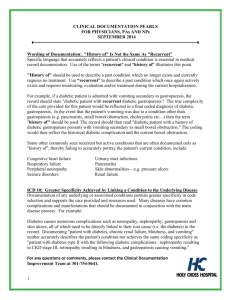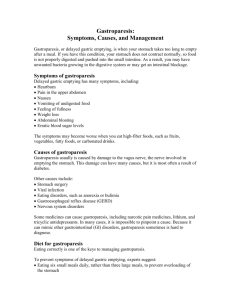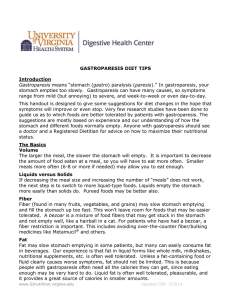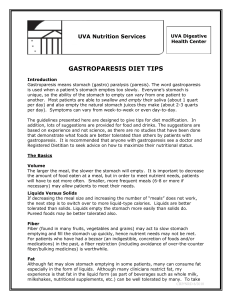Dietary Suggestions For Gastroparesis - Part Two
advertisement
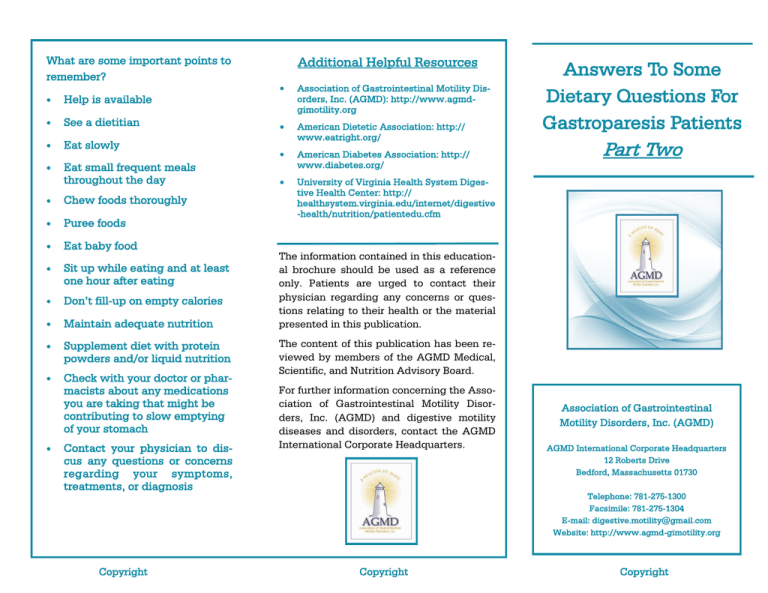
What are some important points to remember? x Help is available x See a dietitian x Eat slowly x Eat small frequent meals throughout the day x Chew foods thoroughly x Puree foods x Eat baby food x Sit up while eating and at least one hour after eating x 'RQ·WILOO-up on empty calories x Maintain adequate nutrition x Supplement diet with protein powders and/or liquid nutrition x Check with your doctor or pharmacists about any medications you are taking that might be contributing to slow emptying of your stomach x Contact your physician to discus any questions or concerns regarding your symptoms, treatments, or diagnosis Copyright Additional Helpful Resources x Association of Gastrointestinal Motility Disorders, Inc. (AGMD): http://www.agmdgimotility.org x American Dietetic Association: http:// www.eatright.org/ x American Diabetes Association: http:// www.diabetes.org/ x University of Virginia Health System Digestive Health Center: http:// healthsystem.virginia.edu/internet/digestive -health/nutrition/patientedu.cfm Answers To Some Dietary Questions For Gastroparesis Patients Part Two The information contained in this educational brochure should be used as a reference only. Patients are urged to contact their physician regarding any concerns or questions relating to their health or the material presented in this publication. The content of this publication has been reviewed by members of the AGMD Medical, Scientific, and Nutrition Advisory Board. For further information concerning the Association of Gastrointestinal Motility Disorders, Inc. (AGMD) and digestive motility diseases and disorders, contact the AGMD International Corporate Headquarters. Association of Gastrointestinal Motility Disorders, Inc. (AGMD) AGMD International Corporate Headquarters 12 Roberts Drive Bedford, Massachusetts 01730 Telephone: 781-275-1300 Facsimile: 781-275-1304 E-mail: digestive.motility@gmail.com Website: http://www.agmd-gimotility.org Copyright Copyright More AnswersTo Some Dietary Questions For Gastroparesis Patients - Part Two What is Gastroparesis (GP)? Gastroparesis is a digestive motility disorder affecting the stomach. In normal digestion, peristalsis or the wavelike contractions, move food and liquid content through the digestive tract in a well coordinated rhythmic manner. With gastroparesis, the peristalsis or movement of food and liquid through the stomach to the duodenum (small intestine) is delayed in the absence of a mechanical obstruction. As a result, normal digestion is impaired. What can I eat? So many patients are perplexed as to what they should or should not be eating when it comes to gastroparesis. ,W·V LPSRUWDQW WR QRWH WKDW WKH V\PS toms and severity of gastroparesis can be very unpredictable in nature. This means that a person may eat a food one day and be able to tolerate it reasonably well, yet on another day, have difficulty with that same food. Patients need to be careful that they GRQ·W EHFRPH VR IHDUIXO RI HDWLQJ WKDW their diets become extremely regimented or limited. This can lead to food aversions and nutritional consequences. The following are some suggestions based on questions presented by gastroparesis patients. Copyright Can I eat eggs if I have gastroparesis? Yes, eggs may be eaten. It is best to avoid fried eggs, but poached, hard boiled and scrambled are usually okay. You can eat regular eggs, egg whites, or use egg substitutes. What about meats? Most patients can eat meats that are ground or pureed. What types of meats can I eat? All types of ground or pureed beef, veal, lean pork, and skinless poultry. Baby food meats are also fine to eat. or strained. Some fruit suggestions are bananas, peaches, canned pears, applesauce and strained baby fruits. Fruit juices may also be included. What type of starches can I eat? White bread, bagels, plain rolls pancakes and waffles may be eaten. Cereals can include cream of wheat/rice, Cheerios, Rice Krispies, and Puffed wheat/rice. Plain rice, rice cakes, pasta, and barley are other suggestions. As far as starchy vegetables are concerned, skinless potatoes as well as sweet and mashed can be included in RQH·VGLHW Fish is fine whether it is fresh or frozen. It is best to avoid fried fish, however. Gastroparesis patients may also eat animal crackers, ginger snaps, graham crackers, breadsticks, pretzels, and saltines as snacks. What types of vegetables can I eat? What about dairy products? Vegetables should be cooked, strained, or blenderized. They can be blended with the addition of broth, water, milk, juice or other type of liquids. Strained baby food vegetables are usually well tolerated as are cooked and strained beets and carrots. Mushrooms and vegetable juices may be consumed as well. Whole milk is fine if it is tolerated as is buttermilk, evaporated milk, and flavored milk. There are also many lactose free milk and milk products on the market should you be lactose intolerant. Along with lactose free milk, there are also lactose free cheeses. What about fruits? Frozen yogurts can be very refreshing. Plain or flavored yogurts can also be tolerated and used in recipes as well. What about fish? Fruits may be cooked, blenderized and/ Copyright Are yogurts okay to eat? Copyright
